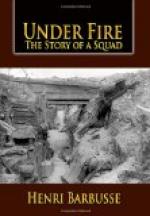A sentimental gentleness seems to have overspread little Eudore, who is curled up in a sort of niche in the ground. He is lost in meditation, pencil in hand, eyes on paper. Dreaming, he looks and stares and sees. It is another sky that lends him light, another to which his vision reaches. He has gone home.
In this time of letter-writing, the men reveal the most and the best that they ever were. Several others surrender to the past, and its first expression is to talk once more of fleshly comforts.
Through their outer crust of coarseness and concealment, other hearts venture upon murmured memories, and the rekindling of bygone brightness: the summer morning, when the green freshness of the garden steals in upon the purity of the country bedroom; or when the wind in the wheat of the level lands sets it slowly stirring or deeply waving, and shakes the square of oats hard by into quick little feminine tremors; or the winter evening, with women and their gentleness around the shaded luster of the lamp.
But Papa Blaire resumes work upon the ring he has begun. He has threaded the still formless disc of aluminium over a bit of rounded wood, and rubs it with the file. As he applies himself to the job, two wrinkles of mighty meditation deepen upon his forehead. Anon he stops, straightens himself, and looks tenderly at the trifle, as though she also were looking at it.
“You know,” he said to me once, speaking of another ring, “it’s not a question of doing it well or not well. The point is that I’ve done it for my wife, d’you see? When I had nothing to do but scratch myself, I used to have a look at this photo”—he showed me a photograph of a big, chubby-faced woman—“and then it was quite easy to set about this damned ring. You might say that we’ve made it together, see? The proof of that is that it was company for me, and that I said Adieu to it when I sent it off to Mother Blaire.”
He is making another just now, and this one will have copper in it, too. He works eagerly. His heart would fain express itself to the best advantage in this the sort of penmanship upon which he is so tenaciously bent.
As they stoop reverently, in their naked earth-holes, over the slender rudimentary trinkets—so tiny that the great hide-bound hands hold them with difficulty or let them fall—these men seem still more wild, more primitive, and more human, than at all other times.
You are set thinking of the first inventor, the father of all craftsmen, who sought to invest enduring materials with the shapes of what he saw and the spirit of what he felt.
* * * * * *
“People coming along,” announces Biquet the mobile, who acts as hall-porter to our section of the trench—“buckets of ’em.” Immediately an adjutant appears, with straps round his belly and his chin, and brandishing his sword-scabbard.
“Out of the way, you! Out of the way, I tell you! You loafers there, out of it! Let me see you quit, hey!” We make way indolently. Those at the sides push back into the earth by slow degrees.




